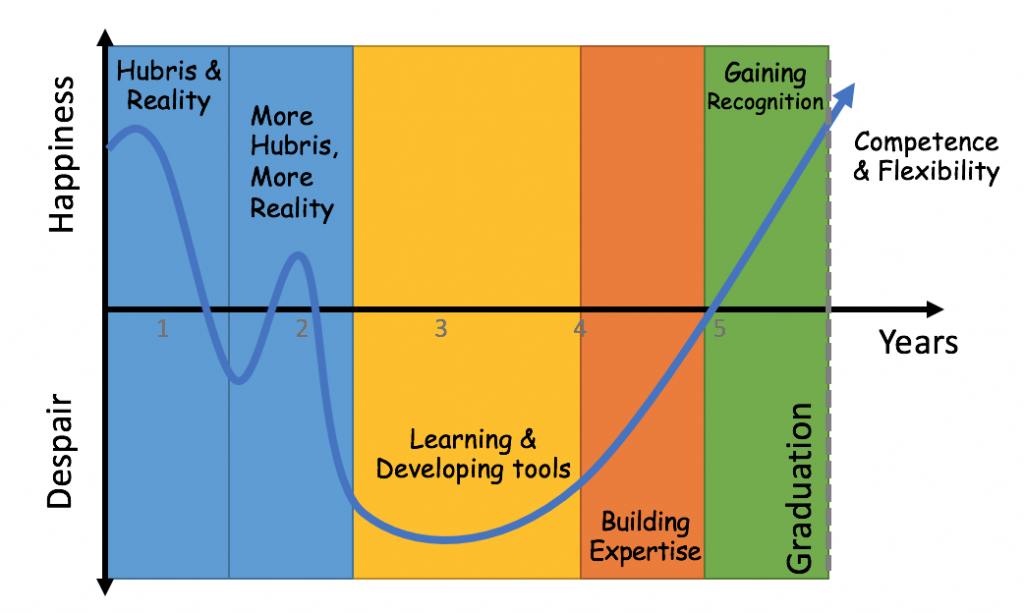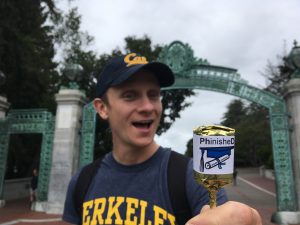PhinisheD! PhDone! I got my lollipop- after five years of classes, research, and lab presentations, I’ve finally finished the journey! And before I forget what it’s like to be in the swamp, I wanted to jot down thoughts about how I got through it.
The PhD Roller Coaster
Everyone is excited when they begin their PhD. Everyone spends a few years in minor despair, looking for direction. And everyone finishes. The path, though, is an emotional roller coaster whipping you through optimism, hubris, despair, hope, and eventually confidence.

What the PhD feels like for most people: alternating periods of optimistic hubris and despair
The good news is that you aren’t alone: everyone goes through this, and everyone gets out.. Even better, the painful parts are usually periods of profound learning- the times when you’re really stretching yourself, but painfully aware of your shortcomings.

Growth through the phases of the PhD
Just as pressure creates diamond, the continud self-doubt and despair will distill your strengths from that initial optimism.
It will come to an end
For better or worse, you’ll eventually finish your PhD- eventually your advisor will get pressure to graduate you, your department won’t want to keep funding you, and it will become clear that you’re ready to move on (or become a postdoc). So even if the PhD feels endless, don’t worry- it will come to an end.
Conversely, take your time to enjoy the process and the growth, connections, and opportunities that it brings. Build up a network with your fellow students who will become your colleagues and peers, take advantage of the financial stability of your fellowship to try out high-risk ideas which might not work, and use your intellectual freedom to pursue new ideas and career options (especially non-academic ones).
Before you know it, you’ll be wrapping up your dissertation, ready or not!
Coping Mechanisms
You aren’t alone, and shouldn’t feel like it on the path- all PhD studnets go through these feelings, and can commiserate, comfort, and motivate you. When I spent two weeks away from the lab, I would begin questioning my research and my pace- but then reconnecting with other students at a lab meeting would remind me that everyone struggles, nobody is fast, and this is a marathon and not a race.
High-performing PhD students aren’t used to not knowing the answers- but the point of a PhD is to find the places where nobody knows the answers. To help navigate this unfamiliar terrain, lean on your advisor- get comfortable asking for help in both research and life. They’ve also been through the same experience, and want you to succeed- even though it may not feel like it at times.
Humor is helpful: to remember that these research problems aren’t cataclysmic, that there’s bright spots in darkness, and that others feel the same way and have gotten throguh it. My dissertation was initially dedicated to @ShitAcademicsSay, but Lego Grad Student and LegoAcademic have also been helpful.
Take-Aways: Learning to Learn
I’ve become a big expert in a very small field- a field which won’t be relevant to my next job, and will be outdated in a few years anyway. So more important than my specific domain knowledge are the metacognitive skills I’ve picked up along the way: being able to identify good questions, rapidly becoming competent in a new field, and being able to tie together different disciplines.
For me, the biggest change in my attitude was brought about by reading Mindset by Carol Dweck- I wish I’d been given this at the beginning of my undergrad experience. This made me appreciate the difficulties, focus on the learning opportunities, and chase the hard (and rewarding) problems.
Moving forwards, I know that I’m not an expert in every field, and don’t expect that my PhD research will amount to much- but I know that I’ll be able to surmount new challenges as they’re presented to me.

Berkeley doesn’t have a thesis defense. Instead, once your faculty committee signs off on your thesis and you hand in your paperwork, you are given a lollipop indicating that you are PhinisheD.
